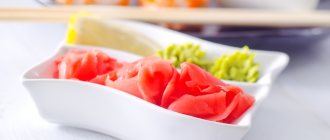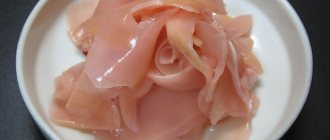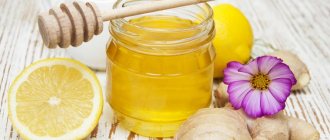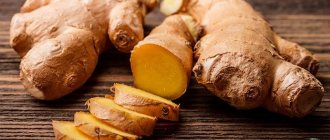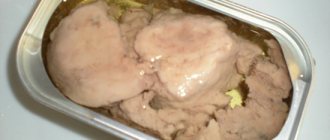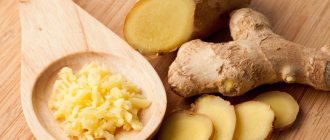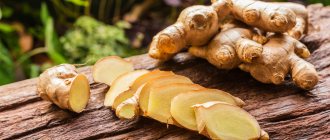Loading…
Loading…
Pickled ginger came to Russia on the wave of popularity of oriental cuisine. Along with Japanese and Chinese delicacies, national seasonings also became available to domestic gourmets. Today, interest in juicy rhizomes with a pungent taste and fresh aroma is fueled not only by culinary specialists, but also by lovers of exotic crops. Ginger plants can be found on indoor window sills and even in country greenhouses.
If you try a fresh root, a person unfamiliar with it before will be amazed by the pungent taste, juiciness and refreshing tonic ability of the product. In ancient times, the rhizomes of the plant were valued as a remedy for fever and various infections. Ginger-based remedies were considered an elixir for male and female infertility and were used to treat intestinal ailments and joint pain. Modern studies of the root have fully confirmed the guesses of the ancient Aesculapians.
Chemical composition
Energy value (KBZHU) per 100 grams:
- Calorie content – 42.12 kcal.
- Proteins – 0.51 g.
- Fats – 0.40 g.
- Carbohydrates – 11.88 g.
| Vitamins | B vitamins (B1, B2, B4, B5, B6, B9), vitamins E, K, C, PP, alpha Tocopherol, choline, Folate, acids (folic, pantothenic nicotinic). |
| Microelements | Iron (Fe), Manganese (Mn), Copper (Cu), Selenium (Se), Zinc (Zn). |
| Macronutrients | Potassium (K), Calcium (Ca), Magnesium (Mg), Sodium (Na), Phosphorus (P). |
Vitamins and minerals contained in pickled ginger
Vitamins:
A – 0.015 mg, B2 – 0.19 mg, B1 – 0.046 mg, C – 12 mg.
Minerals:
sodium – 32 mg, iron – 10.5 mg, zinc – 4.73 mg, potassium – 1.34 mg, calcium – 58 mg, phosphorus – 74 mg, magnesium – 92 mg.
Read other interesting articles on the topic:
The benefits of tea with ginger Ginger honey for weight loss What are the benefits of ginger root Losing weight with ginger Ginger juice for weight loss Recipes with ginger for weight loss Dishes with ginger for weight loss
What color of product is better to eat – red, pink, yellow or white?
On store shelves you can see ginger of different colors: red, pink, yellow and white. Many people are probably wondering how one type of ginger differs from another.
The color of ginger depends on how it was pickled , and also, naturally, on the type of initial raw material. Red or pink ginger is obtained by using beet juice or red wine in recipes. But if the ingredient is a marinade of rice or wine vinegar, the color will turn out yellow or white.
Red ginger differs from white ginger only in taste; in terms of beneficial properties and chemical composition, they are almost completely identical. However, pink ginger contains more carbohydrates and slightly higher calorie content, unlike white ginger. It also contains more thiamine (B1). Unlike pink ginger, white ginger does not contain magnesium, but it does contain zinc.
Pickled ginger recipe
- For 170 g of root cut into “petals” or “shavings”, take 50 g of Japanese rice vinegar, 2 teaspoons of salt and 3 tablespoons of sugar;
- Place the ginger in a deep ceramic bowl, heat the rice vinegar and dissolve salt and sugar in it. Pour the marinade over the ginger, leave to cool and marinate;
- The product is ready for use after 6 hours.
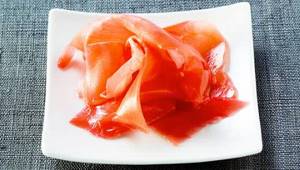
For people who don't eat sugar, pickle ginger in rice vinegar with a little salt and then add a little water with sweetener for taste.
Ginger sometimes gets its pink color with the help of the most basic food coloring - red beets.
Pickled ginger prepared according to this recipe is placed in a glass jar and can be stored in the refrigerator for 3-4 months.
Benefits and harms for the human body
Is the product useful and for what?
Ginger is very beneficial for the body . This is due to its rich chemical composition. You could even say that this seemingly inconspicuous root is a whole natural pharmacy. Ginger has the following effects on the body:
- pain reliever;
- anti-inflammatory;
- wound healing;
- tonic;
- antimicrobial;
- improves hair growth;
- cleanses the kidneys, liver and respiratory tract;
- removes bile and water;
- has a beneficial effect on the nervous system.
The use of ginger for weight loss is very widespread. Rapid weight loss due to its use is due to its positive effect on metabolic processes.
Root:
- converts food into heat;
- prevents the formation of fatty deposits;
- cleanses the body of waste and toxins;
- reduces gas formation;
- prevents Alzheimer's disease;
- gives strength for an active life.
Watch an interesting video about the benefits of pickled ginger:
Contraindications

- Heart problems (heart attacks, strokes).
- Ulcer, gastritis, pancreatitis, cholecystitis, cholelithiasis and other gastrointestinal diseases.
- Third trimester of pregnancy and breastfeeding period.
- Individual intolerance;
- Cramps.
- Insomnia.
Harm
Excessive consumption of ginger can cause exacerbation of gastritis, colitis and other gastrointestinal diseases. The essential oils contained in pickled ginger can cause an allergic reaction - rash, redness and more serious symptoms.
In addition, if you eat too much ginger, your cardiovascular and nervous system will be overstimulated. This can lead to anxiety, insomnia and increased heart rate.
Can children eat ginger?
The opinions of pediatricians regarding the benefits of consuming ginger in infancy vary. For example, representatives of oriental medicine allow the intake of a herbal product with the introduction of complementary foods to infants, since the product has a positive effect on the intestines of babies, eliminating colic and preventing constipation.
Modern European doctors are inclined to believe that the seasoning has a very intense, irritating effect on the mucous membranes of internal organs, can provoke increased salivation and therefore allow ginger to be taken in small portions only from 1.5-2 years of age.

Children are most often given decoctions or tea with the addition of ginger, which help cure respiratory diseases and bronchitis. Essential oils are used as an inhalation agent for viral diseases and coughs. Ginger drinks can help with:
- nausea and vomiting;
- digestive disorders.
Did you know? The word “gingerbread” appeared in the Russian language thanks to the appearance of spicy gingerbread, which merchants brought from European countries.
How is it good for the health of people after 50 years of age?
Is it good for people over 50 to eat the product? The chemical composition of ginger contributes to its positive effects on the human body at any age. But it’s no secret that after 50 years, many diseases worsen in a person, and the body becomes weaker. Therefore, in old age, introducing ginger into the diet will not be at all superfluous . It perfectly slows down the aging process and has a good effect on the appearance and condition of both the male and female body. The fact is that ginger:
- thins the blood;
- removes cholesterol;
- prevents the development of cancer;
- helps with arthritis and rheumatism;
- normalizes blood pressure;
- speeds up metabolism, helps with weight loss;
- strengthens teeth and gums;
- stimulates sexual activity;
- helps with diseases of the genitourinary system.
Among other things, ginger is also widely used in cosmetology. Due to its rejuvenating effect, various face masks are often made from pickled ginger. Such masks are especially popular among women of mature age and older.
Reference! Recipe for anti-aging mask with ginger: 1 tbsp.
grated pickled ginger root and mix with 2 tbsp. honey Apply to face and neck for 15 minutes. Apply once a week. This mask will perfectly even out your complexion, make your skin firmer and more elastic, get rid of fine wrinkles, and tighten your facial contour. In addition, this mask has a tonic effect and removes toxins from cells.
Beneficial properties of pickled ginger
In fact, the beneficial properties of pickled ginger can be summarized as follows:
- naturally fermented pickled ginger is a source of prebiotics, it is beneficial for digestion and helps improve the health of intestinal flora;
- this product allows you to diversify your diet and get a general strengthening effect;
- ginger has mild laxative and diuretic effects;
- ginger essential oils enhance the taste of certain dishes and contribute to greater satisfaction from meals;
- ginger improves immunity, contains fiber, and, finally, it is simply delicious.
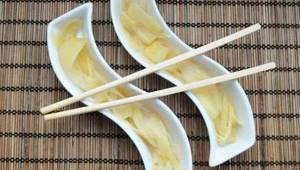
Some popular websites say that pickled ginger enhances...charm. Apparently, this refers to the olfactory sensations, and not the ability to attract people and make friends. One way or another, eating ginger is recommended in folk medicine to avoid bad breath.
Pickled ginger is a folk remedy for motion sickness and so-called “seasickness.” It is recommended to simply keep a piece of it in your mouth during a particularly exhausting journey. Indeed, moderate consumption may suppress nausea. It is often recommended to eat pickled ginger root when you have a cold.
It is often written that ginger can replace multivitamins from the pharmacy. This is not true, of course, because the root is not complete in composition and does not contain most of the B vitamins. But properly prepared ginger root can be an additional source of vitamin C.
It is often written that pickled ginger is a real remedy for weight loss. Of course, this story is nothing more than an exaggeration. You can chew the root before meals, but it will only work for those people for whom all this causes appetite suppression. There is no rigorous evidence that pickled ginger helps burn fat. Studies have been conducted, the results of which have proven that ginger, in fact, can be considered a thermogenic. Its use literally “warms up” the body and speeds up metabolism. But the effect is insignificant. You can burn about 40 kcal per day this way. This is not enough for serious weight loss.
However, pickled ginger can be a good choice in that it adds variety to your diet. But it is variety that is often lacking for people who adhere to a certain diet and exercise. This improves the quality of life. As a result, a person becomes less obsessed with food intake and simply has a healthier relationship with food. And this helps to reduce appetite and reduce the likelihood of a breakdown. Any healthy person who counts calories to lose weight can include ginger in their diet. After all, this product is one of those that is eaten in quantities not exceeding 30 g. So there is no need to be afraid of high calories.
Pickled ginger, however, is more of a seasoning and less of an independent product, so it is important not to overuse it. And yes, it contains sugar. So you will have to decide whether it is useful to you or not.
Why do you sometimes want to eat it?
The main reason is a lack of vitamins and minerals in the body that are contained in ginger. Also, there may be a need for this root if a person has the following diseases and problems:
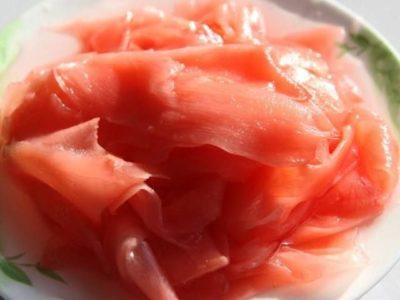
indigestion;- abdominal pain;
- skin problems;
- rheumatism and arthritis;
- weak immunity;
- frequent headaches;
- pain after exercise;
- urinary tract diseases;
- diabetes;
- disorders of the pancreas;
- hypertension;
- anemia;
- presence of cholesterol;
- weak heart muscle, failure;
- dysfunction of the thyroid gland;
- recovery after surgery;
- prostatitis, impotence, infertility;
- depression;
- physical or mental fatigue.
Features of selection and storage
The level of benefit depends on the quality of the original product. An old, half-dried root is unlikely to have retained half of its unique properties. To select a quality product, various methods are used:
- You need to break off a piece from the selected rhizome. If you hear a crunch, a drop of juice appears at the break, and the characteristic smell becomes strong and rich, you can safely pay for your purchase.
- The color determines where the root grows. This is important because the characteristics of the plant change slightly depending on climate conditions. The light skin and golden interior indicate that it is a native of Asia; it has a soft, rich taste and a persistent aroma. The darker product is brought from Africa. It has a more pronounced bitterness, the taste is straightforward, without a rich aftertaste, and for this reason it costs less. The benefits and harms of their use are approximately the same, and both varieties are used for weight loss.
- Smell is a reliable indicator of freshness. If there is the slightest hint of dampness or mustiness, the product cannot be purchased.
- Size matters. Larger rhizomes contain more nutrients. But if awakened buds or seedlings are visible, then the plant has begun a new round of vegetation and is no longer suitable for therapeutic procedures. It can be purchased for home planting. After 2-3 months in the soil, it will again acquire its lost qualities.
- The appearance of the fresh product excludes damage, soft areas with darkening or traces of mold.
The root cannot be stored fresh for a long time. After a week in the refrigerator, it begins to lose its medicinal properties, turning into an ordinary spicy seasoning. After purchasing, it is better to leave a small part for the next few days, and marinate the rest in one of several ways.
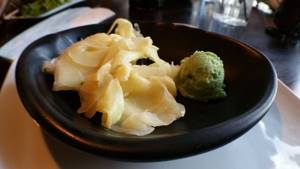
During pickling, only young roots acquire a coral color; mature root vegetables do not change color.
How much can you eat per day and how often?
A healthy person who has no contraindications can eat approximately 100 g of ginger per day , in a proportion of 2 grams per 1 kg of weight. The daily dose must be divided into 3-4 servings; eating all 100 grams of ginger in one go is not recommended. Abuse of this product can lead to bad consequences and negatively affect the body.
We talked in more detail about the norms for ginger consumption and the problems caused by exceeding it here.
Overdose symptoms
- Nausea.
- Heartburn.
- Vomit.
- Diarrhea;.
- Stomach ache.
Along with these symptoms, headache and weakness may appear, and sweating may increase. In some cases, overeating ginger can even cause an allergic reaction .
What to do?
- When the first symptoms appear, the first thing you need to do is drink water - this will reduce the concentration of ginger in the stomach and wash it away from the walls of the digestive tract. If diarrhea does not occur due to overeating, then you can replace water with milk, as it is more effective.
- After this, you must definitely take a medicine - Smecta, Almagel, Enterosgel or some other medicine with a similar effect.
- Naturally, the daily dose of ginger should be reduced by at least half, and it is better to exclude it from the menu for at least a week.
Ginger root has unique properties, is universal in use and is an effective remedy in the fight against parasites, weakened immunity, colds and coughs. Read about how to prepare and properly take medicinal products from ginger with lemon, honey and mineral water, as well as the benefits of oil, candied fruits and juice from this product.
In addition to all of the above, ginger has another amazing property - it perfectly freshens breath and sharpens the sensitivity of taste buds. That is why it is so widespread in cooking. It is worth noting that in nature there are quite a few plants that are equally useful and at the same time pleasant to the taste . The introduction of ginger into the diet is almost necessary in our time, when there is so little useful in the things around us. However, do not forget about contraindications. Before adding this root to the menu, you should definitely consult your doctor.
If you find an error, please select a piece of text and press Ctrl+Enter.
Possible harm
Ginger can be harmful to your health! The product is capable of retaining fluid in the body. It is not recommended for pregnant women and people suffering from chronic kidney disease.
There are other contraindications to the use of aromatic seasoning:
- Allergic reaction to ginger root;
- Pathologies of the gastrointestinal tract.
The pickled snack should be eaten in small quantities: approximately 10 grams per day. It is recommended to prepare it at home yourself. Store-bought products often contain preservatives and harmful dyes.
THESE ARTICLES WILL HELP YOU LOSE WEIGHT
Your feedback on the article:
( 307 ratings, average: 4.48 out of 5)
Contraindications for use
Pickled ginger, the benefits and harms of which are individual for each person, causes a deterioration in health in the following cases:
- in acute form of peptic ulcer;
- for liver diseases, including hepatitis or during the recovery period after them;
- with a tendency to colitis;
- with exacerbation of gastritis;
- with diarrhea;
- for diseases of the gallbladder and the presence of stones in it;
- for problems with the pancreas;
- during pregnancy (ginger can cause uterine contractions);
- during breastfeeding (milk may acquire a specific taste and excessive tonic properties);
- in case of individual intolerance to one of the components of the root;
- with poor blood clotting;
- children under 3 years old;
- before performing surgery and receiving anesthesia.
Cooking at home (video)
The most convenient visual example is a video recipe on how to make pickled ginger correctly yourself.
Pickled ginger is a tasty and healthy addition to your diet. But in order to get the maximum benefit from using the product, you need to know how to choose or prepare the spice, store it and what contraindications there are. Also, do not forget about the daily norm - no more than 10 g.
Did you like the article? Like ♥, subscribe to our channel and you will be one of the first to know about new publications!
And if you have something to share, leave your comments! Your feedback is very important to us!
